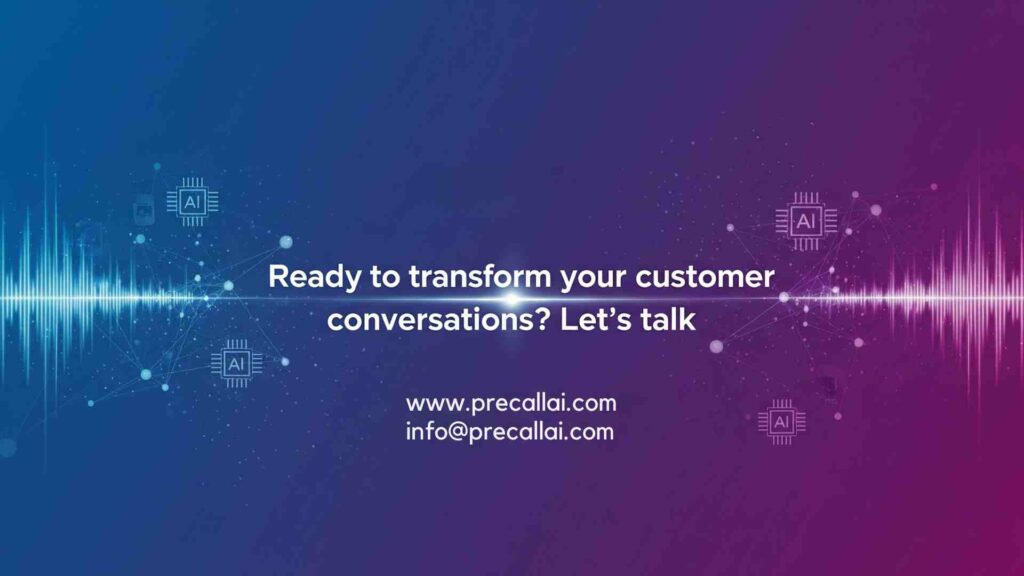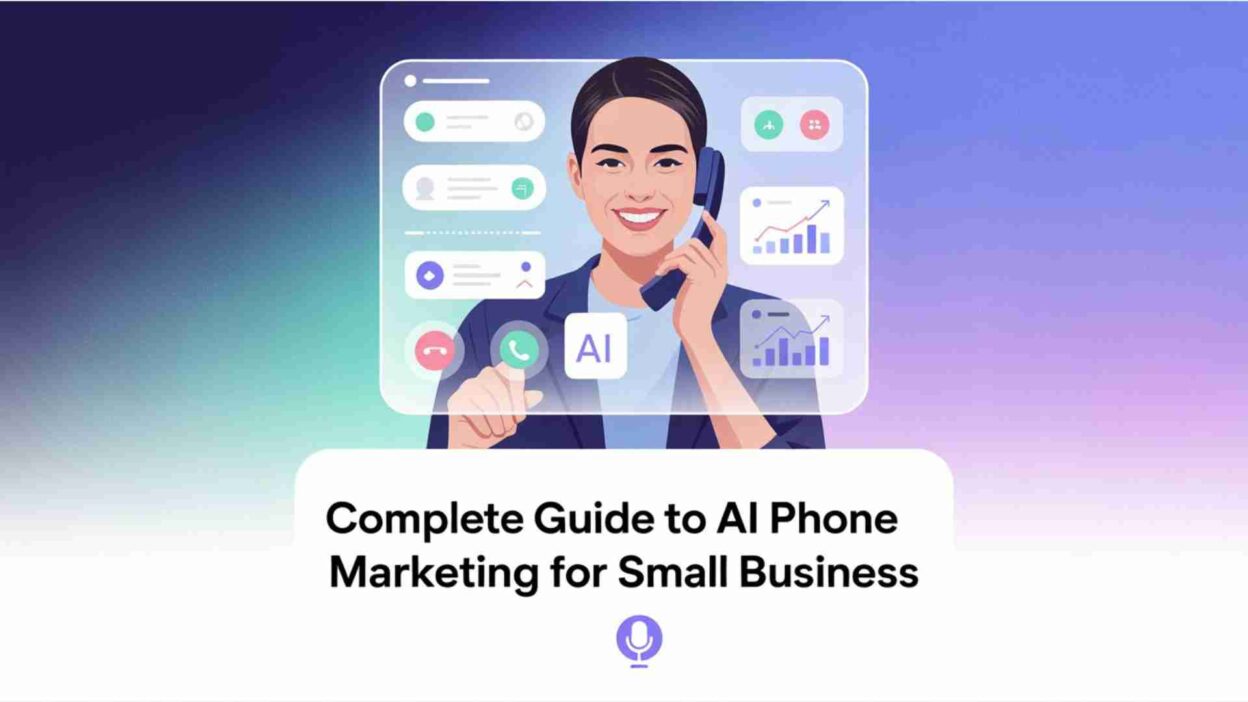Introduction
TL;DR AI phone marketing revolutionizes how small businesses connect with customers and prospects. Small business owners struggle with limited time and resources for effective outreach campaigns. Traditional phone marketing requires significant manpower and training costs that many small companies cannot afford.
Table of Contents
Automated phone calls powered by artificial intelligence solve these challenges efficiently. Modern AI technology enables businesses to reach hundreds of prospects daily without hiring additional staff. Smart automation handles routine calls while maintaining personalized customer experiences.
This comprehensive guide explores every aspect of AI phone marketing for small businesses. You will learn implementation strategies, cost-effective solutions, and proven techniques for maximum results.
What Is AI Phone Marketing?
AI phone marketing uses artificial intelligence technology to automate phone-based customer outreach and engagement. The system makes calls, delivers messages, and collects responses without human intervention during basic interactions.
Core Components of AI Phone Marketing
Voice Recognition Technology: Modern AI systems understand natural speech patterns and respond appropriately to customer queries. The technology processes spoken words in real-time and provides relevant information instantly.
Natural Language Processing: AI analyzes conversation context and sentiment to deliver appropriate responses. Advanced algorithms understand customer emotions and adjust communication tone accordingly.
Automated Dialing Systems: Smart dialing technology manages contact lists and optimizes call timing for maximum connection rates. The system tracks busy signals, voicemails, and successful connections automatically.
Data Integration Capabilities: AI phone marketing platforms connect with existing CRM systems and customer databases seamlessly. Real-time data synchronization ensures accurate customer information during every interaction.
Benefits of AI Phone Marketing for Small Businesses
Cost Reduction and Efficiency
Small businesses save 60-80% on traditional phone marketing costs through AI automation. Manual calling campaigns require dedicated staff members who handle a limited calls per hour.
AI systems make 200-500 calls per hour compared to 30-50 manual calls by human representatives. This dramatic efficiency increase translates to faster lead generation and customer acquisition.
Reduced Labor Costs
Businesses eliminate salaries, benefits, and training expenses for dedicated phone marketing staff. One AI system replaces 3-5 human callers while working 24/7 without breaks.
Lower Training Requirements
AI systems require minimal setup compared to extensive human training programs. New campaigns launch within hours instead of the weeks needed for human team preparation.
Improved Customer Engagement
Consistent Message Delivery: AI ensures every prospect receives identical information without human error or inconsistency. Professional voice quality remains constant across thousands of calls daily.
Personalized Interactions: Advanced AI systems customize messages using customer data and previous interaction history. Personalization increases response rates by 40-60% compared to generic messaging.
24/7 Availability: Automated systems reach customers across different time zones and schedules efficiently. Evening and weekend calling capabilities expand potential customer contact opportunities.
Enhanced Data Collection and Analytics
AI phone marketing provides detailed analytics on every call attempt and customer interaction. Small businesses gain valuable insights into customer preferences and behavior patterns.
Real-Time Performance Metrics: Dashboard analytics show call completion rates, response statistics, and conversion data instantly. Business owners make informed decisions based on current campaign performance.
Customer Response Analysis: AI tracks customer sentiment and feedback across all interactions automatically. This data helps refine messaging strategies and improve future campaign effectiveness.
Types of AI Phone Marketing Solutions
Interactive Voice Response (IVR) Systems
IVR technology handles incoming customer calls and routes them to the appropriate departments automatically. Small businesses use IVR to manage customer service inquiries without dedicated phone staff.
Menu Navigation Systems
Customers select options using keypad inputs or voice commands to reach desired services. Professional greetings and clear instructions enhance customer experience quality.
Appointment Scheduling Integration
Advanced IVR systems connect with calendar software to schedule appointments automatically. Customers book services without speaking to human representatives during off-hours.
Outbound Campaign Automation
Lead Generation Calls: AI systems contact prospect lists to introduce products and services professionally. Automated scripts deliver consistent messaging while capturing interested leads efficiently.
Follow-Up Communications: Automated systems handle post-purchase follow-ups and customer satisfaction surveys systematically. Regular touchpoints maintain customer relationships without manual intervention.
Promotional Campaigns: AI delivers time-sensitive offers and promotional messages to targeted customer segments. Dynamic messaging adjusts based on customer purchase history and preferences.
Voice Broadcasting Solutions
Mass communication campaigns reach hundreds of customers simultaneously with important announcements. Small businesses use voice broadcasting for event notifications and service updates.
Emergency Notifications: Automated systems deliver urgent messages to customer bases quickly during emergencies. Medical practices and service providers maintain communication during disruptions.
Marketing Announcements: Promotional voice messages reach large audiences cost-effectively compared to traditional advertising methods. Businesses announce sales events and new product launches efficiently.
Implementation Strategies for Small Businesses
Choosing the Right AI Phone Marketing Platform
Feature Requirements Assessment: Small businesses should identify essential features before selecting AI phone marketing solutions. Core requirements include call volume capacity, integration capabilities, and reporting functions.
Budget Considerations: Monthly subscription costs range from $50-500, depending on features and call volume limits. Businesses must balance functionality needs with available marketing budgets.
Scalability Planning: Growing businesses need platforms that expand capabilities as customer bases increase. Flexible pricing models accommodate business growth without platform changes.
Setting Up Your First Campaign
Customer Data Preparation: Clean contact lists ensure higher connection rates and better campaign performance. Remove outdated numbers and duplicate entries before launching automated campaigns.
Script Development: Professional scripts balance information delivery with conversation flow naturally. Messages should be concise while providing necessary details about products or services.
Compliance Verification: AI phone marketing must comply with local telecommunications regulations and privacy laws. Proper opt-in procedures and do-not-call list management prevent legal issues.
Optimizing Campaign Performance
A/B Testing Strategies: Test different message versions to identify the most effective communication approaches. Small variations in script wording can significantly impact response rates.
Timing Optimization: Analyze call success rates across different times and days to maximize connections. Local business hours and customer demographics influence optimal calling windows.
Response Rate Monitoring: Track key performance indicators, including answer rates, engagement levels, and conversion percentages. Regular monitoring enables quick adjustments for improved results.
Best Practices for AI Phone Marketing Success
Message Crafting Techniques
Clear Value Propositions: Every automated call should communicate specific benefits customers receive from your products or services. Vague messaging fails to capture the prospect’s attention effectively.
Professional Tone Maintenance: AI voice quality should sound natural and professional throughout the entire conversation. Poor voice synthesis creates negative impressions and reduces campaign effectiveness.
Call-to-Action Integration: Each message must include clear next steps for interested prospects to take action. Simple instructions like “Press 1 to speak with a representative” guide customer responses.
Compliance and Ethical Considerations
Regulatory Adherence: Small businesses must follow national and local laws governing automated calling practices. Registration requirements and calling time restrictions vary by location.
Privacy Protection: Customer data used in AI phone marketing campaigns requires secure handling and storage. Proper encryption and access controls protect sensitive information.
Opt-Out Mechanisms: Automated systems must provide easy methods for customers to remove themselves from calling lists. Immediate removal capabilities demonstrate respect for customer preferences.
Integration with Existing Marketing Efforts
Multi-Channel Coordination: AI phone marketing works best when coordinated with email campaigns and social media outreach. Consistent messaging across channels reinforces brand recognition.
CRM System Synchronization: Customer relationship management platforms should connect seamlessly with AI phone marketing tools. Unified customer data improves personalization and tracking capabilities.
Sales Team Collaboration: Human sales representatives handle qualified leads generated through automated phone campaigns. Smooth handoff processes maximize conversion opportunities.
Measuring ROI and Performance
Key Performance Indicators
Call Completion Rates: Successful connection percentages indicate campaign reach effectiveness and contact list quality. Industry averages range from 15-25% for cold outreach campaigns.
Lead Generation Metrics: Track qualified leads generated per campaign to measure marketing investment returns. Cost per lead calculations help optimize budget allocation decisions.
Customer Acquisition Costs: Compare AI phone marketing expenses to customer lifetime value for profitability analysis. Lower acquisition costs improve overall business profitability margins.
Analytics and Reporting Tools
Real-Time Dashboard Monitoring: Modern AI platforms provide live campaign performance data for immediate decision-making. Business owners monitor call progress and adjust strategies promptly.
Historical Trend Analysis: Long-term performance data reveals seasonal patterns and optimization opportunities. Historical insights guide future campaign planning and resource allocation.
Custom Report Generation: Flexible reporting tools create specific analyses for different business needs and stakeholder requirements. Detailed reports support strategic planning and budget justification.
Common Challenges and Solutions
Technical Implementation Issues
System Integration Difficulties: Complex CRM connections may require technical expertise beyond small business capabilities. Professional setup services ensure proper platform integration and functionality.
Voice Quality Concerns: Poor audio quality damages brand reputation and reduces customer engagement levels. Premium voice synthesis options provide more natural-sounding automated calls.
Scalability Limitations: Basic AI phone marketing plans may restrict call volumes as businesses grow. Upgrade planning prevents service interruptions during expansion phases.
Regulatory Compliance Challenges
Do-Not-Call List Management: Automated systems must check calling lists against government do-not-call registries regularly. Non-compliance results in significant financial penalties for businesses.
Call Time Restrictions: Local laws limit automated calling hours to protect consumer privacy rights. Geographic diversity requires careful time zone management for national campaigns.
Recording and Consent Requirements: Some jurisdictions require explicit consent before recording customer conversations. Clear disclosure statements protect businesses from legal liability issues.
Customer Reception and Acceptance
Negative Perceptions of Automated Calls: Many consumers view automated calls negatively due to spam and robocall experiences. High-quality AI systems with natural voices reduce negative reactions.
Trust Building Challenges: Customers may hesitate to engage with automated systems for sensitive business discussions. Transparent communication about AI usage builds customer confidence.
Personalization Expectations: Modern consumers expect personalized experiences even from automated systems. Advanced AI capabilities meet these expectations through data-driven customization.
Future Trends in AI Phone Marketing
Advanced AI Capabilities
Emotion Recognition Technology: Next-generation AI systems will detect customer emotions during conversations and adjust responses accordingly. Emotional intelligence improves customer satisfaction and engagement rates.
Multilingual Communication: Advanced language processing enables AI systems to communicate effectively across different languages and cultural contexts. Global market expansion becomes more accessible for small businesses.
Predictive Analytics Integration: AI will predict optimal calling times and message content based on individual customer behavior patterns. Predictive capabilities maximize campaign effectiveness and efficiency.
Integration with Emerging Technologies
Voice Assistant Compatibility: AI phone marketing will integrate with popular voice assistants for seamless customer experiences. Smart speaker interactions expand communication channel options.
Video Calling Capabilities: Future AI systems will handle video calls with realistic avatars for enhanced customer engagement. Visual communication adds credibility and personal connection elements.
Blockchain Verification: Distributed ledger technology will verify call authenticity and prevent fraudulent automated calling practices. Blockchain integration builds consumer trust in legitimate business communications.
Industry-Specific Applications
Healthcare and Medical Practices
Medical offices use AI phone marketing for appointment reminders and health screening notifications. Patient engagement improves while reducing the administrative workload significantly.
Prescription Refill Reminders
Automated systems remind patients about medication refills before supplies run out. Timely reminders improve patient health outcomes and pharmacy relationships.
Preventive Care Outreach
AI calls promote annual checkups and screening appointments to maintain patient health. Proactive communication demonstrates a care provider’s commitment to patient wellness.
Real Estate and Property Management
Real estate agents leverage AI phone marketing for lead qualification and property showing coordination. Automated systems handle initial prospect screening efficiently.
Property Inquiry Responses
AI systems provide immediate responses to property listing inquiries outside business hours. Quick responsiveness improves lead conversion rates significantly.
Tenant Communication
Property managers use automated calls for rent reminders and maintenance scheduling coordination. Efficient communication reduces administrative overhead costs.
Retail and E-commerce
Online retailers implement AI phone marketing for customer support and sales follow-up communications. Automated systems enhance customer service capabilities cost-effectively.
Order Status Updates
Customers receive automated calls about shipment status and delivery scheduling information. Proactive communication reduces customer service inquiry volumes.
Promotional Campaign Delivery
Retail businesses announce sales events and special offers through targeted automated calling campaigns. Personal touch increases promotional response rates.
Cost Analysis and Budgeting
Pricing Models and Structures
AI phone marketing platforms offer various pricing structures to accommodate different business sizes and needs. Understanding cost models helps small businesses make informed investment decisions.
Per-minute pricing: Some providers charge based on actual call duration and connection time. This model works well for businesses with unpredictable call volumes.
Monthly Subscription Plans Fixed monthly fees include specific call allowances and feature access levels. Predictable costs help small businesses manage marketing budgets effectively.
Enterprise Solutions: Larger call volumes and advanced features require higher-tier pricing plans. Growing businesses should consider upgrade costs in long-term planning.
Return on Investment Calculations
Customer Acquisition Metrics: Calculate customer lifetime value compared to AI phone marketing campaign costs. Positive ROI justifies continued investment in automated calling solutions.
Time Savings Valuations: Convert staff time savings to monetary value for a complete ROI analysis. Automated systems free human resources for higher-value business activities.
Revenue Attribution: Track sales directly attributed to AI phone marketing campaigns for accurate performance measurement. Clear attribution demonstrates marketing channel effectiveness.
Getting Started with AI Phone Marketing
Initial Planning and Preparation
Business Goal Definition: Clearly define objectives for AI phone marketing implementation before platform selection. Specific goals guide feature requirements and success metrics.
Target Audience Identification: Understand customer demographics and communication preferences for campaign optimization. Detailed audience profiles improve message relevance and response rates.
Resource Allocation Planning: Determine budget limits and staff time availability for campaign management activities. Proper resource planning ensures sustainable implementation success.
Platform Selection and Setup
Vendor Evaluation Process: Compare multiple AI phone marketing providers based on features, pricing, and support quality. Thorough evaluation prevents costly platform changes later.
Trial Period Utilization: Take advantage of free trials to test platform functionality with real business data. Hands-on experience reveals platform strengths and limitations.
Training and Onboarding: Invest time in proper platform training to maximize feature utilization and campaign effectiveness. Well-trained users achieve better results faster.
Launch and Optimization
Pilot Campaign Execution: Begin with small-scale test campaigns to refine processes before implementing them fully. Pilot testing identifies potential issues and optimization opportunities.
Performance Monitoring: Establish regular review schedules to analyze campaign performance and make necessary adjustments. Consistent monitoring ensures optimal results.
Continuous Improvement: Implement ongoing optimization based on performance data and customer feedback. Regular improvements maintain competitive advantages.
Read More: How AI Can Predict Customer Needs
Conclusion

AI phone marketing represents a transformative opportunity for small businesses to compete effectively with larger enterprises. Advanced automation technology enables efficient customer outreach while maintaining professional communication standards.
Small business owners who embrace AI phone marketing gain significant competitive advantages through cost reduction and improved efficiency. Automated systems handle routine communications while human staff focus on high-value activities.
Success with AI phone marketing requires careful planning, proper implementation, and ongoing optimization efforts. Businesses that invest time in learning and refining their approach achieve remarkable results.
The future of small business marketing includes AI-powered communication as a standard practice. Early adopters establish market positions while competitors struggle with traditional manual methods.
Start exploring AI phone marketing solutions today to transform your business outreach capabilities. Professional automated calling systems are more accessible and affordable than ever before, supporting the success of small businesses.





[…] AI email marketing combines machine learning algorithms with behavioral analytics to create highly personalized email experiences. Modern systems process subscriber data in real-time to deliver relevant content at optimal moments. […]
[…] to understand which marketing investments deliver the highest returns. Companies implementing marketing mix modeling achieve 15-20% improvement in marketing ROI through optimized budget allocation […]